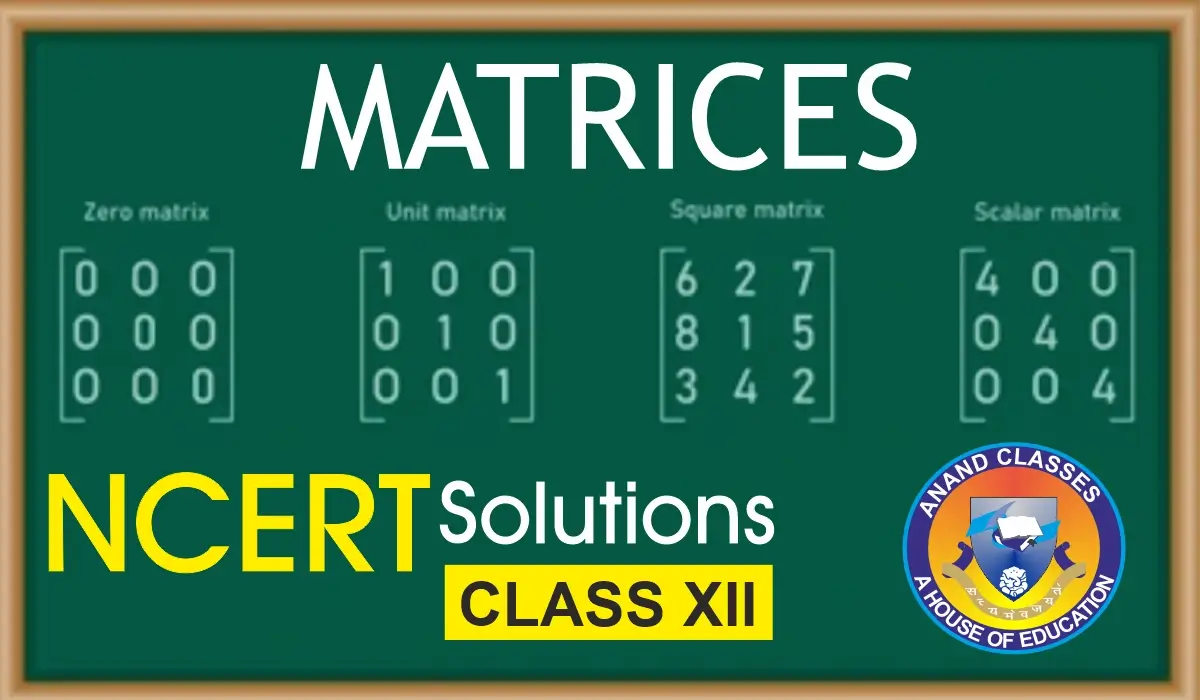Anand Classes offers a comprehensive, free-downloadable PDF of NCERT Solutions for Class 12 Maths Chapter 7 – Integrals, Exercise 7.5 (Set-1 Study Material), tailored for students aiming to master the method of integration by partial fractions—a key topic detailed in Exercise 7.5 of the NCERT syllabus. As noted on educational platforms, this exercise focuses entirely on integrating rational functions by decomposing them into partial fractions. These solutions are crafted in alignment with the latest CBSE/NCERT framework and include clear, step-by-step explanations to strengthen your problem-solving abilities. Click the print button to download study material and notes.
NCERT Question 1: Evaluate the integral
$$\int \frac{x}{(x+1)(x+2)}\ dx$$
Solution
$$\int \frac{x}{(x+1)(x+2)}\ dx$$
Use partial fraction decomposition:
$$\frac{x}{(x+1)(x+2)} = \frac{A}{x+1} + \frac{B}{x+2}$$
Multiply both sides by $(x+1)(x+2)$:
$$x = A(x+2) + B(x+1)$$
Equate coefficients of $x$ and constants:
- Coefficient of $x$: $A + B = 1$
- Constant term: $2A + B = 0$
Solve the system:
$$A = -1, \quad B = 2$$
So
$$\frac{x}{(x+1)(x+2)} = -\frac{1}{x+1} + \frac{2}{x+2}$$
Step 1: Integrate each term
$$\int \frac{x}{(x+1)(x+2)}\ dx = \int \left(-\frac{1}{x+1} + \frac{2}{x+2}\right) dx$$
$$\int \frac{x}{(x+1)(x+2)}\ dx = -\ln|x+1| + 2\ln|x+2| + C$$
Combine logarithms:
$$\int \frac{x}{(x+1)(x+2)}\ dx = \ln \left[\frac{(x+2)^2}{|x+1|}\right] + C$$
Final Answer
$$\boxed{\ln\left[\frac{(x+2)^2}{|x+1|}\right] + C}$$
Download complete NCERT integral solutions and practice notes from Anand Classes—perfect for JEE, CBSE, and other competitive exam preparation.
NCERT Question 2: Evaluate the integral
$$\int \frac{dx}{x^2-9}$$
Solution
$$\int \frac{dx}{x^2-9}$$
Use partial fraction decomposition:
$$\frac{1}{x^2-9} = \frac{1}{(x+3)(x-3)} = \frac{A}{x+3} + \frac{B}{x-3}$$
Multiply both sides by $(x+3)(x-3)$:
$$1 = A(x-3) + B(x+3)$$
Equate coefficients of $x$ and constants:
- Coefficient of $x$: $A + B = 0$
- Constant term: $-3A + 3B = 1$
Solve the system:
$$A = -\frac{1}{6}, \quad B = \frac{1}{6}$$
So
$$\frac{1}{x^2-9} = -\frac{1}{6(x+3)} + \frac{1}{6(x-3)}$$
Step 1: Integrate each term
$$\int \frac{dx}{x^2-9} = \int \left(-\frac{1}{6(x+3)} + \frac{1}{6(x-3)}\right) dx$$
$$\int \frac{dx}{x^2-9} = -\frac{1}{6} \ln|x+3| + \frac{1}{6} \ln|x-3| + C$$
Combine logarithms:
$$\int \frac{dx}{x^2-9} = \frac{1}{6} \ln \left|\frac{x-3}{x+3}\right| + C$$
Final Answer
$$\boxed{\frac{1}{6} \ln \left|\frac{x-3}{x+3}\right| + C}$$
Download step-by-step NCERT integral solutions and concise revision notes from Anand Classes—perfect for JEE, CBSE, and competitive exam preparation.
NCERT Question 3: Evaluate the integral
$$\int \frac{3x-1}{(x-1)(x-2)(x-3)} \; dx$$
Solution
$$\int \frac{3x-1}{(x-1)(x-2)(x-3)} \; dx$$
Use partial fraction decomposition:
$$\frac{3x-1}{(x-1)(x-2)(x-3)} = \frac{A}{x-1} + \frac{B}{x-2} + \frac{C}{x-3}$$
Multiply both sides by $(x-1)(x-2)(x-3)$:
$$3x-1 = A(x-2)(x-3) + B(x-1)(x-3) + C(x-1)(x-2) \quad \text{(i)}$$
Substitute $x = 1, 2, 3$ respectively to solve for $A, B, C$:
$$x=1: 3(1)-1=2 = A(-1)(-2) \implies A=1$$
$$x=2: 3(2)-1=5 = B(1)(-1) \implies B=-5$$
$$x=3: 3(3)-1=8 = C(2)(1) \implies C=4$$
So
$$\frac{3x-1}{(x-1)(x-2)(x-3)} = \frac{1}{x-1} – \frac{5}{x-2} + \frac{4}{x-3}$$
Step 1: Integrate each term
$$\int \frac{3x-1}{(x-1)(x-2)(x-3)} \; dx = \int \left(\frac{1}{x-1} – \frac{5}{x-2} + \frac{4}{x-3}\right) dx$$
$$\int \frac{3x-1}{(x-1)(x-2)(x-3)} \; dx = \ln|x-1| – 5 \ln|x-2| + 4 \ln|x-3| + C$$
Final Answer
$$\boxed{\ln|x-1| – 5 \ln|x-2| + 4 \ln|x-3| + C}$$
Download complete NCERT integral solutions and stepwise tricks from Anand Classes—perfect for JEE, CBSE, and other competitive exam preparation.
NCERT Question 4: Evaluate the integral
$$\int \frac{x}{(x-1)(x-2)(x-3)} \; dx$$
Solution
$$\int \frac{x}{(x-1)(x-2)(x-3)} \; dx$$
Use partial fraction decomposition:
$$\frac{x}{(x-1)(x-2)(x-3)} = \frac{A}{x-1} + \frac{B}{x-2} + \frac{C}{x-3}$$
Multiply both sides by $(x-1)(x-2)(x-3)$:
$$x = A(x-2)(x-3) + B(x-1)(x-3) + C(x-1)(x-2) \quad \text{(i)}$$
Substitute $x = 1, 2, 3$ respectively to solve for $A, B, C$:
$$x=1: 1 = A(-1)(-2) \implies A = \frac{1}{2}$$
$$x=2: 2 = B(1)(-1) \implies B = -2$$
$$x=3: 3 = C(2)(1) \implies C = \frac{3}{2}$$
So
$$\frac{x}{(x-1)(x-2)(x-3)} = \frac{1}{2(x-1)} – \frac{2}{x-2} + \frac{3}{2(x-3)}$$
Step 1: Integrate each term
$$\int \frac{x}{(x-1)(x-2)(x-3)} \;dx = \int \left(\frac{1}{2(x-1)} – \frac{2}{x-2} + \frac{3}{2(x-3)}\right) dx$$
$$\int \frac{x}{(x-1)(x-2)(x-3)} \;dx = \frac{1}{2} \ln|x-1| – 2 \ln|x-2| + \frac{3}{2} \ln|x-3| + C$$
Final Answer
$$\boxed{\frac{1}{2} \ln|x-1| – 2 \ln|x-2| + \frac{3}{2} \ln|x-3| + C}$$
Download detailed NCERT integral solutions and step-by-step tricks from Anand Classes—ideal for JEE, CBSE, and competitive exam preparation.
NCERT Question 5: Evaluate the integral
$$\int \frac{2x}{x^2+3x+2} \; dx$$
Solution
$$\int \frac{2x}{x^2+3x+2} \; dx$$
Factor the denominator:
$$x^2+3x+2 = (x+1)(x+2)$$
Use partial fraction decomposition:
$$\frac{2x}{(x+1)(x+2)} = \frac{A}{x+1} + \frac{B}{x+2}$$
Multiply both sides by $(x+1)(x+2)$:
$$2x = A(x+2) + B(x+1) \quad \text{(i)}$$
Substitute $x = -1$ and $x = -2$ to solve for $A$ and $B$:
$$x=-1: 2(-1) = -2 = A(1) + B(0) \implies A = -2$$
$$x=-2: 2(-2) = -4 = A(0) + B(-1) \implies B = 4$$
So
$$\frac{2x}{(x+1)(x+2)} = -\frac{2}{x+1} + \frac{4}{x+2}$$
Step 1: Integrate each term
$$\int \frac{2x}{x^2+3x+2} \; dx = \int \left(-\frac{2}{x+1} + \frac{4}{x+2}\right) dx$$
$$\int \frac{2x}{x^2+3x+2} \; dx = -2 \ln|x+1| + 4 \ln|x+2| + C$$
Combine logarithms:
$$\int \frac{2x}{x^2+3x+2} \; dx = \ln \frac{(x+2)^4}{(x+1)^2} + C$$
Final Answer
$$\boxed{\ln \frac{(x+2)^4}{(x+1)^2} + C}$$
Download full NCERT integral solutions and step-by-step tricks from Anand Classes—perfect for JEE, CBSE, and competitive exam practice.
NCERT Question 6: Evaluate the integral
$$\int \frac{1-x^2}{x(1-2x)} \; dx$$
Solution
$$\int \frac{1-x^2}{x(1-2x)} \; dx$$
The integrand is an improper fraction, so first divide:
$$\frac{1-x^2}{x(1-2x)} = \frac{1}{2} + \frac{2-x}{2x(1-2x)}$$
Now decompose the proper fraction:
$$\frac{2-x}{x(1-2x)} = \frac{A}{x} + \frac{B}{1-2x}$$
Multiply both sides by $x(1-2x)$:
$$2-x = A(1-2x) + Bx \quad \text{(i)}$$
Substitute $x=0$ and $x=1/2$ to solve for $A$ and $B$:
$$x=0: 2 = A(1) + B(0) \implies A=2$$
$$x=1/2: 2-1/2=3/2 = A(0) + B(1/2) \implies B=3$$
So
$$\frac{2-x}{x(1-2x)} = \frac{2}{x} + \frac{3}{1-2x}$$
Substitute back:
$$\frac{1-x^2}{x(1-2x)} = \frac{1}{2} + \frac{1}{2} \left(\frac{2}{x} + \frac{3}{1-2x}\right)$$
Step 1: Integrate term by term
$$\int \frac{1-x^2}{x(1-2x)} \; dx = \int \left[ \frac{1}{2} + \frac{1}{2} \left(\frac{2}{x} + \frac{3}{1-2x}\right) \right] dx$$
$$\int \frac{1-x^2}{x(1-2x)} \; dx = \int \frac{1}{2} dx + \int \frac{1}{x} dx + \frac{3}{2} \int \frac{1}{1-2x} dx$$
$$\int \frac{1-x^2}{x(1-2x)} \; dx = \frac{x}{2} + \ln|x| + \frac{3}{2} \cdot \left(-\frac{1}{2} \ln|1-2x|\right) + C$$
$$\int \frac{1-x^2}{x(1-2x)} \; dx = \frac{x}{2} + \ln|x| – \frac{3}{4} \ln|1-2x| + C$$
Final Answer
$$\boxed{\frac{x}{2} + \ln|x| – \frac{3}{4} \ln|1-2x| + C}$$
Download step-by-step NCERT integral solutions and tricks from Anand Classes—perfect for JEE, CBSE, and competitive exams.
NCERT Question 7: Evaluate the integral
$$\int \frac{x}{(x^2+1)(x-1)} \; dx$$
Solution
$$\int \frac{x}{(x^2+1)(x-1)} \; dx$$
Use partial fraction decomposition:
$$\frac{x}{(x^2+1)(x-1)} = \frac{Ax+B}{x^2+1} + \frac{C}{x-1}$$
Multiply both sides by $(x^2+1)(x-1)$:
$$x = (Ax+B)(x-1) + C(x^2+1)$$
Expand:
$$x = Ax^2 – Ax + Bx – B + Cx^2 + C$$
Equate coefficients of $x^2$, $x$, and constant term:
$$
\begin{cases}
A + C = 0 \\
-A + B = 1 \\
-B + C = 0
\end{cases}
$$
Solving gives:
$$A = -\frac{1}{2}, \quad B = \frac{1}{2}, \quad C = \frac{1}{2}$$
So
$$\frac{x}{(x^2+1)(x-1)} = \frac{-\frac{1}{2}x + \frac{1}{2}}{x^2+1} + \frac{1}{2}\frac{1}{x-1}$$
Step 1: Integrate each term
$$\int \frac{x}{(x^2+1)(x-1)} \; dx = -\frac{1}{2} \int \frac{x}{x^2+1} dx + \frac{1}{2} \int \frac{dx}{x^2+1} + \frac{1}{2} \int \frac{dx}{x-1}$$
Consider
$$\int \frac{2x}{x^2+1} dx = \ln|x^2+1|$$
Thus
$$-\frac{1}{2} \int \frac{x}{x^2+1} dx = -\frac{1}{4} \int \frac{2x}{x^2+1} dx = -\frac{1}{4} \ln|x^2+1|$$
$$\frac{1}{2} \int \frac{1}{x^2+1} dx = \frac{1}{2} \tan^{-1}x$$
$$\frac{1}{2} \int \frac{1}{x-1} dx = \frac{1}{2} \ln|x-1|$$
Combine terms:
$$\int \frac{x}{(x^2+1)(x-1)} dx = \frac{1}{2} \ln|x-1| – \frac{1}{4} \ln|x^2+1| + \frac{1}{2} \tan^{-1}x + C$$
Final Answer
$$\boxed{\frac{1}{2} \ln|x-1| – \frac{1}{4} \ln|x^2+1| + \frac{1}{2} \tan^{-1}x + C}$$
Download detailed NCERT integral solutions from Anand Classes—perfect for JEE, CBSE, and other competitive exams.
NCERT Question 8: Evaluate the integral
$$\int \frac{x}{(x-1)^2 (x+2)} \; dx$$
Solution
$$\int \frac{x}{(x-1)^2 (x+2)} \; dx$$
Use partial fraction decomposition:
$$\frac{x}{(x-1)^2 (x+2)} = \frac{A}{x-1} + \frac{B}{(x-1)^2} + \frac{C}{x+2}$$
Multiply both sides by $(x-1)^2 (x+2)$:
$$x = A(x-1)(x+2) + B(x+2) + C(x-1)^2$$
Substitute $x = 1$:
$$B = \frac{1}{3}$$
Equate coefficients of $x^2$ and constants:
$$
\begin{cases}
A + C = 0 \\
-2A + 2B + C = 0
\end{cases}
$$
Solving gives:
$$A = \frac{2}{9}, \quad B = \frac{1}{3}, \quad C = -\frac{2}{9}$$
So
$$\frac{x}{(x-1)^2 (x+2)} = \frac{2}{9(x-1)} + \frac{1}{3(x-1)^2} – \frac{2}{9(x+2)}$$
Step 1: Integrate each term
$$ \int \frac{x}{(x-1)^2 (x+2)} dx = \frac{2}{9} \int \frac{1}{x-1} dx + \frac{1}{3} \int \frac{1}{(x-1)^2} dx – \frac{2}{9} \int \frac{1}{x+2} dx $$
$$ \int \frac{x}{(x-1)^2 (x+2)} dx = \frac{2}{9} \ln|x-1| + \frac{1}{3} \left(-\frac{1}{x-1}\right) – \frac{2}{9} \ln|x+2| + C $$
Combine logarithms:
$$\int \frac{x}{(x-1)^2 (x+2)} dx = \frac{2}{9} \ln\left|\frac{x-1}{x+2}\right| – \frac{1}{3(x-1)} + C$$
Final Answer
$$\boxed{\frac{2}{9} \ln\left|\frac{x-1}{x+2}\right| – \frac{1}{3(x-1)} + C}$$
Download comprehensive NCERT integral solutions from Anand Classes—ideal for JEE, CBSE, and other competitive exams.
NCERT Question 9: Evaluate the integral
$$\int \frac{3x+5}{x^3 – x^2 – x + 1} \; dx$$
Solution
$$\int \frac{3x+5}{x^3 – x^2 – x + 1} \; dx$$
Factor the denominator:
$$x^3 – x^2 – x + 1 = (x-1)^2 (x+1)$$
Use partial fraction decomposition:
$$\frac{3x+5}{(x-1)^2 (x+1)} = \frac{A}{x-1} + \frac{B}{(x-1)^2} + \frac{C}{x+1}$$
Multiply both sides by $(x-1)^2(x+1)$:
$$3x + 5 = A(x-1)(x+1) + B(x+1) + C(x-1)^2$$
Substitute $x = 1$:
$$B = 4$$
Equate coefficients of $x^2$ and $x$:
$$
\begin{cases}
A + C = 0 \\
B – 2C = 3
\end{cases}
$$
Solving gives:
$$A = -\frac{1}{2}, \quad B = 4, \quad C = \frac{1}{2}$$
So
$$\frac{3x+5}{(x-1)^2 (x+1)} = -\frac{1}{2}\frac{1}{x-1} + \frac{4}{(x-1)^2} + \frac{1}{2}\frac{1}{x+1}$$
Step 1: Integrate each term
$$ \int \frac{3x+5}{(x-1)^2 (x+1)} dx = -\frac{1}{2} \int \frac{dx}{x-1} + 4 \int \frac{dx}{(x-1)^2} + \frac{1}{2} \int \frac{dx}{x+1} $$
$$ \int \frac{3x+5}{(x-1)^2 (x+1)} dx = -\frac{1}{2} \ln|x-1| – \frac{4}{x-1} + \frac{1}{2} \ln|x+1| + C $$
Combine logarithms:
$$\int \frac{3x+5}{(x-1)^2 (x+1)} dx = \frac{1}{2} \ln\left|\frac{x+1}{x-1}\right| – \frac{4}{x-1} + C$$
Final Answer
$$\boxed{\frac{1}{2} \ln\left|\frac{x+1}{x-1}\right| – \frac{4}{x-1} + C}$$
Get more top-quality partial fraction integrals and NCERT solutions from Anand Classes, perfect for JEE and CBSE exam preparation.
NCERT Question 10: Evaluate the integral
$$\int \frac{2x-3}{(x^2-1)(2x+3)} \; dx$$
Solution
$$\int \frac{2x-3}{(x^2-1)(2x+3)} \; dx$$
Factor the denominator:
$$(x^2-1)(2x+3) = (x+1)(x-1)(2x+3)$$
Use partial fraction decomposition:
$$\frac{2x-3}{(x+1)(x-1)(2x+3)} = \frac{A}{x+1} + \frac{B}{x-1} + \frac{C}{2x+3}$$
Multiply both sides by $(x+1)(x-1)(2x+3)$:
$$2x-3 = A(x-1)(2x+3) + B(x+1)(2x+3) + C(x^2-1)$$
Expand each term:
$$
A(x-1)(2x+3) = 2A x^2 + A x – 3A \\[10pt]
B(x+1)(2x+3) = 2B x^2 + 5B x + 3B \\[10pt]
C(x^2-1) = C x^2 – C
$$
Combine like terms:
$$2x – 3 = (2A + 2B + C)x^2 + (A + 5B)x + (-3A + 3B – C)$$
Equating coefficients:
$$
\begin{cases}
2A + 2B + C = 0 \\
A + 5B = 2 \\
-3A + 3B – C = -3
\end{cases}
$$
Solving gives:
$$A = \frac{5}{2}, \quad B = -\frac{1}{10}, \quad C = -\frac{24}{5}$$
Step 1: Integrate each term
$$
\int \frac{2x-3}{(x^2-1)(2x+3)} dx = \int \frac{5/2}{x+1} dx + \int \frac{-1/10}{x-1} dx + \int \frac{-24/5}{2x+3} dx $$
$$\int \frac{2x-3}{(x^2-1)(2x+3)} dx = \frac{5}{2} \ln|x+1| – \frac{1}{10} \ln|x-1| – \frac{24}{5} \cdot \frac{1}{2} \ln|2x+3| + C $$
$$\int \frac{2x-3}{(x^2-1)(2x+3)} dx = \frac{5}{2} \ln|x+1| – \frac{1}{10} \ln|x-1| – \frac{12}{5} \ln|2x+3| + C $$
Final Answer
$$\boxed{\frac{5}{2} \ln|x+1| – \frac{1}{10} \ln|x-1| – \frac{12}{5} \ln|2x+3| + C}$$
Download detailed NCERT integral solutions by Anand Classes, perfect for JEE and CBSE exam preparation with step-by-step methods.
NCERT Question 11: Evaluate the integral
$$\int \frac{5x}{(x+1)(x^2-4)} \; dx$$
Solution
$$\int \frac{5x}{(x+1)(x^2-4)} \; dx$$
Factor the quadratic:
$$x^2-4 = (x+2)(x-2)$$
So the integrand becomes:
$$\frac{5x}{(x+1)(x+2)(x-2)}$$
Use partial fraction decomposition:
$$\frac{5x}{(x+1)(x+2)(x-2)} = \frac{A}{x+1} + \frac{B}{x+2} + \frac{C}{x-2}$$
Multiply both sides by $(x+1)(x+2)(x-2)$:
$$5x = A(x+2)(x-2) + B(x+1)(x-2) + C(x+1)(x+2)$$
Substitute $x=-1, -2, 2$ to solve for $A, B, C$:
$$
A = \frac{5}{3}, \quad B = -\frac{5}{2}, \quad C = \frac{5}{6}
$$
Step 1: Integrate each term
$$
\int \frac{5x}{(x+1)(x^2-4)} dx = \int \frac{5/3}{x+1} dx + \int \frac{-5/2}{x+2} dx + \int \frac{5/6}{x-2} dx $$
$$\int \frac{5x}{(x+1)(x^2-4)} dx = \frac{5}{3} \ln|x+1| – \frac{5}{2} \ln|x+2| + \frac{5}{6} \ln|x-2| + C $$
Final Answer
$$\boxed{\frac{5}{3} \ln|x+1| – \frac{5}{2} \ln|x+2| + \frac{5}{6} \ln|x-2| + C}$$
Download top-quality NCERT integration solutions by Anand Classes, perfect for JEE and CBSE preparation with clear step-by-step explanations.
NCERT Question 12: Evaluate the integral
$$\int \frac{x^3+x+1}{x^2-1} \; dx$$
Solution
$$\int \frac{x^3+x+1}{x^2-1} \; dx$$
The integrand is an improper fraction. Perform polynomial division:
$$
\frac{x^3+x+1}{x^2-1} = x + \frac{2x+1}{x^2-1}
$$
Decompose the proper fraction using partial fractions:
$$
\frac{2x+1}{x^2-1} = \frac{2x+1}{(x+1)(x-1)} = \frac{A}{x+1} + \frac{B}{x-1}
$$
Multiply through by $(x+1)(x-1)$:
$$
2x+1 = A(x-1) + B(x+1)
$$
Substitute $x=1$ and $x=-1$:
$$
A = \frac{1}{2}, \quad B = \frac{3}{2}
$$
So:
$$
\frac{x^3+x+1}{x^2-1} = x + \frac{1}{2(x+1)} + \frac{3}{2(x-1)}
$$
Step 1: Integrate each term
$$
\int \frac{x^3+x+1}{x^2-1} dx = \int x dx + \frac{1}{2} \int \frac{1}{x+1} dx + \frac{3}{2} \int \frac{1}{x-1} dx
$$
$$
\int \frac{x^3+x+1}{x^2-1} dx = \frac{x^2}{2} + \frac{1}{2} \ln|x+1| + \frac{3}{2} \ln|x-1| + C
$$
Final Answer
$$\boxed{\frac{x^2}{2} + \frac{1}{2} \ln|x+1| + \frac{3}{2} \ln|x-1| + C}$$
Download detailed NCERT integration solutions by Anand Classes, ideal for mastering polynomial fraction integrals for JEE and CBSE exams.


